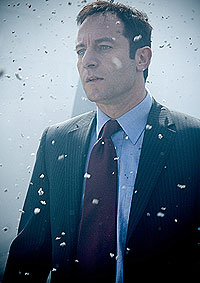|
Did
you prepare for the role by reading Sir
Christopher Meyer's book 'DC Confidential'?
Or are you not that sort of ambassador?
Dan and
Lizzie spent time in Washington with Sir
David Manning (the current ambassador) and
his staff and were not only fonts of wisdom
but also gave me the transcripts of all
their interviews. The BBC made their
documentary archive available, which had
some classic diplomatic and fashion
disasters to emulate and avoid, and I read
Sir Christopher's book. Mostly, though,
since we were creating an ambassador who was
enough of a maverick to have ruffled
feathers all along, I locked myself in a
room with Dan and Lizzie and we played 'what
if'. What if the ambassador wasn't the
public school Oxbridge graduate we expect?
What if he was a close friend of the PM?
What if, when our story begins, he was about
to enter politics proper? On a more
superficial note, I got the braces idea from
Sir Christopher's habit of wearing red socks
all the time and Michael Grade's famous
braces. Only halfway through shooting did I
find out that everyone hated them – but by
then it was too late!
|
|

|
|
Ruffling feathers: 'The challenge
was to create a flawed character who
struggles to do the right thing'
|
You
play a British ambassador striving to save
the world from terrorist attack. Isn't that
a bit unrealistic? Apart from everything
else, Blair emasculated the Foreign Office
years ago …
An
ambassador, in the words of Henry Wooton,
'is an honest man sent abroad to lie for his
country'. His job, traditionally, is simple:
to prevent war. It might be argued that that
has changed over the past five years, given
the recent doctrine of the pre-emptive
strike, but mostly they are there to quell
fears, calm misunderstandings and whisper in
ears. Reading Sir Christopher's memoirs of
his time in Washington during the decision
to go to war with Iraq was a real eye-opener
into just how influential these unelected
representatives are: whom they know, who
takes their call – who trusts them can have
a massive effect on international relations.
On top of all that, Mark Brydon's a maverick
anyway: everyone – literally all the
parties, including the oppressed population
– stands to gain from the invasion and
regime change that the world hurtles towards
in the story, but Mark smells a rat and he's
reached a stage in his life and career when
one more cover-up might be one too many.
What's unusual in the script – and for me as
an actor – is that he has to solve these
problems with diplomacy, manipulation, guile
and not a gun, a bag of money and a horse. |